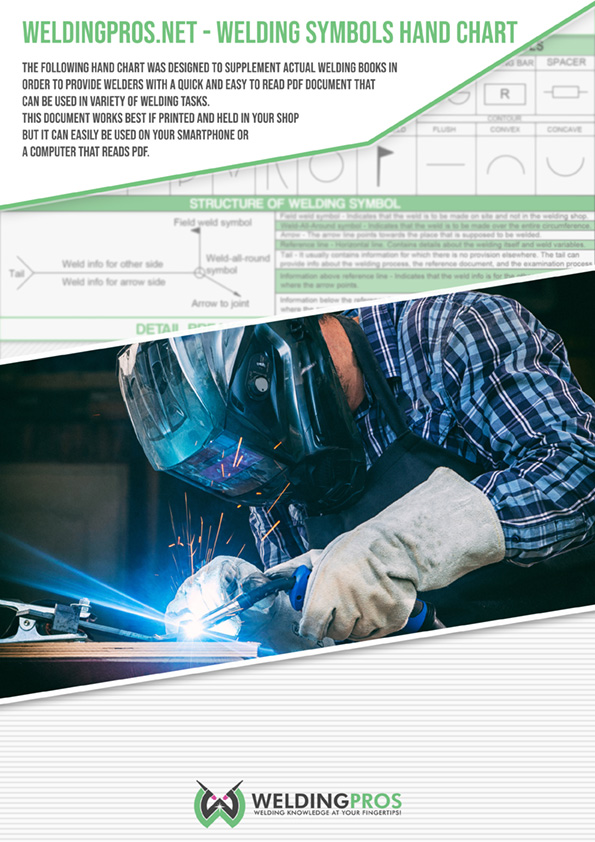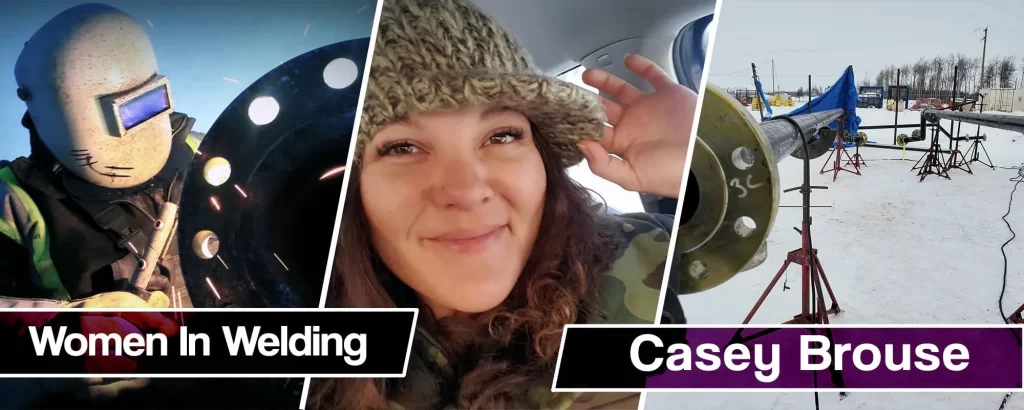
When you meet Casey Brouse, a hard-working, talented, devoted, and strong gal, you realize that in this male-dominated industry, as welding is, it’s a pleasure to find beautiful women behind dusty welder’s helmet.
In common misconception that women can’t do too well in the welding trade, it’s so good that we have a gem like Casey who shows that tables take their turns. She’s an exceptional SMAW welder with more than a decade of fieldwork in mud, rain show, and other not-so-fun conditions that most guys would shy away from. After twenty years in this industry, her work speaks for itself.
Listening to her story, her ups, and downs, you find a genuinely positive being. From her early days in welding school to her first jobs or from the fight to be recognized to all other challenging projects in her long welding career. In this demanding and stimulating profession that puts you in the middle of the action, you find Casey, who can be a true inspiration to everyone because bravery and faith in yourself can put you through anything.
She’s not so much in all those fancy things. She puts importance is in the quality of working and getting things done. As she would say:
Her variety of skills is impressive. It’s not just in the welding business that she tries to master those skills. Casey also hunts, goes fishing, and produces her own food, and yes, she’s a great cook. How powerful is that? In front of us is a woman that can literally do everything that many just can’t.
Let us hear the story of Casey Brouse.
Q: How did you find yourself under the welding hood?
Okay. So, believe it or not, I was a straight-A student, and I wanted to go to school for law or psychology. My dad being a “square head,” that’s what we call Germans, wanted me to go to school right now, so he said: “No, you have to go to school, pick something.”
So, I went to the back of the book, and I was like, I want to do plumbing, carpentry, welding, and he told me I could pick only one.
I literally went “eenie meenie miney mo” and landed on welding and went to welding school. From welding school, I ended up coming up to Northern BC.
My sister lived in Dawson, so I started working in a shop fabricating gates, but my boss ripped me off. He told me he would pay me by the gate instead of by the hour and I had all the “art” stocked up, all the orders done, and then he changed his mind, I guess.
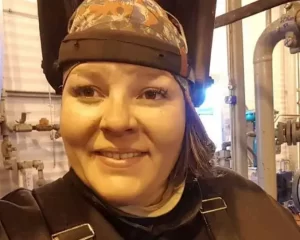
He paid me by the hour, so I was shocked cause I was taking all these days off thinking that I was making all this money. So I quit and applied for work, and pretty much I had to move from Dawson Creek to Fort Saint John overnight to start pipelining and being a welder’s helper in the welding and gas industry.
That was August 2003, and I went to welding school in 2002.
Q: What is it like to be a woman in the predominately male industry?
Casey: It was pretty hard in the industry having a V., to be honest. And it’s like I am finally getting recognized after long twenty years.
It was pretty hard in the industry having a V., to be honest. And it’s like I am finally getting recognized after long twenty years. Well, I guess I was finally recognized about five years ago; I was the main welder for all this progress work up here for one of the main companies, like the fastest welding.
I was getting to be known then and now… You know you are the second person to interview me this year because this lady at work interviewed me as well as being an indigenous female trade’s person who worked at straight projects.
Q: Did you plan to branch out on other welding processes?
Casey: I do not plan on learning any other way of welding, and I actually may shut the door on welding here right away. I was like: “Everything is paid for; I have investments I have done really well.
I got sick two years ago. I woke up coughing up blood, and I had double pneumonia and a blood infection. And every time I hop in that welding truck, I want to light up a smoke, and if something breaks down on the way back to town, I smoke another ten cigarettes. You know what I mean, it goes hand in hand.
I had a real hard time getting rid of those bad habits while I’m still welding, so I might pull the plug here. I’m thinking about selling out. We set another business on the go, my money business on the side just for extra cash, and because I like the products and stuff like that. I have been doing that for about five years, and I guess I’m really talented.
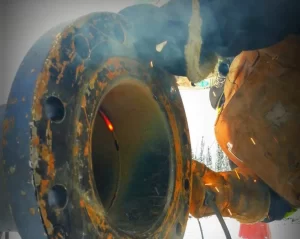
Right now, like when it’s slow, I sew for cash. I like to keep busy. I’ve been sewing a lot of stuff for people around town. It’s not like welding is the only thing I could do. It’s hard to getaway. I like to go fishing or hunting for a month of the year; I enjoy traveling everywhere. Maybe it’s just time to live life a little.
I’m going to be 37 in October, and I feel like I have spent my whole life behind a whelming helmet. I’m sure you can relate to that one.
Q: Looking back, did you have problems with the hourly wage being a woman with a welding hood?
Casey: I don’t know; they don’t treat you as good around here anymore, you know what I mean? It’s getting so cut through. The industry, they just don’t treat you as well. My “main guys” that I worked with have gone to set up different companies and aren’t working as welders at the moment, and there’s just nobody else that I want to work with.
Q: What’s your primary welding process? How did you learn to weld?
Casey: Here we have different classes of welding. What used to be a C welder with zero entry-level, B welder was like learning your pipes and your stainless or your TIG and your pipe and so that you are B. Then if you get a P-pressure, you can weld pipe, and then there is an A ticket which is like the specialty welding like all the TIG pipe and stainless. (I screw that one up).
“Welder Level C” means a person who has training in and is capable of welding various steel and aluminum parts using the SMAW, GMAW, and FCAW processes, in the fabrication, construction, erection, and repair of components or structures, in the plate and structural applications.
Q: You entered the frying pan with a C ticket?
Casey: When I started, they told me that I should begin with sixteen (USD) for my C ticket, but I had to fight for it for two weeks, so I got $14/h for the first two weeks when I started at Flint. There was a constant battle for me to get a raise…
We had a recession in 2000, and I’m going to say eight, maybe, nine, ten? 2008. I think it lasted for a couple of years here, and they just got me my raise.
I fought and fought for a raise to like 24 dollars or something like that, and then they dropped and gave everybody wage decreases.
Dropped everybody, I think 10% or something like that of what they got. I think it was a joke.
They put me back down to less than I was making before, I was so pissed off.
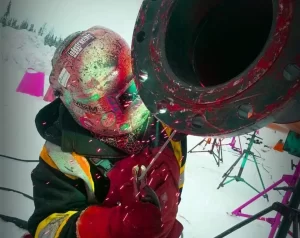
During that recession, I actually went ironworking in 2010, built the Fort Saint John hospital for a year and I worked in a shop for a month, month, and a half, just to get my hand in on fabricating pipe, and that was it. I have been running my truck since.
They put me on the roof on the first day. There were like three or four floors, not actual floors like it was just steel, and I was so scared of heights… They put me right on the roof from the first day. Boys still remind me about that.
Q: With 20 years on your belt, can you tell me where you think the welder can earn the most in the US or Canada?
Casey: As for welding in the US, I have no idea. I know that rig welding, the highest paying, is in Fort Saint John, BC, Northern Bridge Columbia. The highest I have seen was making $115, maybe $120 an hour, full supply running your welding truck well in the welding gas industry.
And Northern Alberta was pretty good at that time too. About seven years ago, I made 10k, 11k a week, only working like eleven hours a day and getting paid 13s. It was right now that rates had dropped down to one hundred, one o five, some places are ninety-five, and because of the control of the qualities these days, they have to supply the welding rod, but they don’t supply like grindings disc, buffing wheels or anything like that anymore.
Once in a while, you get a good job where they give you discs and flapper discs. But that’s almost like next to not even heard anymore. If you are on big pipelines, they supply oxy acetylene because cutting that big pipe can go through many bottles.
Q: Welders usually work as contractors with their own expendables; they aren’t regular company employees?
Casey: Only if you work in a shop, when you are out in the industry – no. In some places, ironworkers get paid “by the hour”. They don’t use any of their own equipment except for their own tools.
When you are welding in a shop, they supply the staff, all your tools, and everything, and when you are out in the field you generally have your own welding truck. Some people rent little four-wheel runners or something like that so they can run through the crap.
Most of the time, you are the contractor, and you have your welding truck, your own company, your everything, your insurances, it’s crazy. Between my house, truck, car, boat, and well-headed insurance, I pay close to like 12k and insurance as a year and back. It’s not something cheap to get rigged up for.
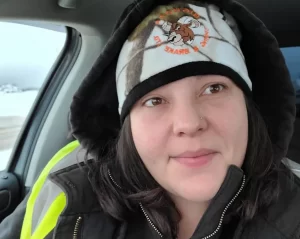
Then there are those guys who have a new truck and new everything, and I’m totally not that person. My welding truck is old and falling apart, and I don’t even care. People are like, “go buy a new truck!” and I am like, Why? This one is already paid for, I’m going to weld with it until it blows up and that it.
I don’t go to work to spend money; I go to work to make money. Many of these guys are not like that, they like all the big fancy things, and that’s why when the recession hits, they are screwed because they have truck payments, welder payments, house payments, and their wife’s car payments…
Q: You have a boat, that’s awesome.
Casey: Boats, I only have insurance on the one, my ocean boat, but yes, sir. I’ve got boats, Timeshares, I have everything except children. That is the one thing I’m longing for. It’s kids.
Q: You are a beast of a woman
Casey: That’s how I was raised. I don’t need much money to live because I hunt, fish, and garden, and we can stuff and dehydrate food and freeze food. We make our own burgers and sausage, everything.
The only thing I buy is chicken and pork once in a while. Which to be honest, with elk, moose, and fish, I don’t really need it either. I get a craving for chicken once in a while. My boyfriend likes pork more than I do. We were raised with all those skills; lots of people don’t have them.
This lady came and said that one guy at work said that I was such a good welder. And I said she can tell them that I am a really good seamstress and cook, too.
Always wanted my own Brady bunch, like I wanted a ton of kids, and that is one of my big regrets right now, but I’m trying to get over that. I never did it. So I’m going to work on making it happen anyway that I have to.
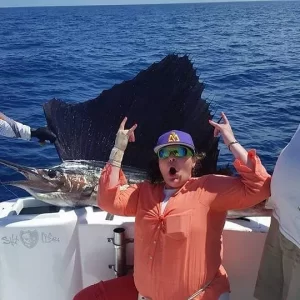
About Casey
Casey has her own welding company that still operates in Fort Saint John, BC and she’s busy as ever, but if you need some welding done and you are in the area you can ring her or send an email and two of you can arrange a deal.
She also dipped her fingers in skincare products and as a welder, I can testify that the face suffers a lot from UV and infrared radiation, plus standing outside on wind or sun all day doesn’t do wonders for your skin. If someone knows how to take care of your face and what works best it’s probably her.




